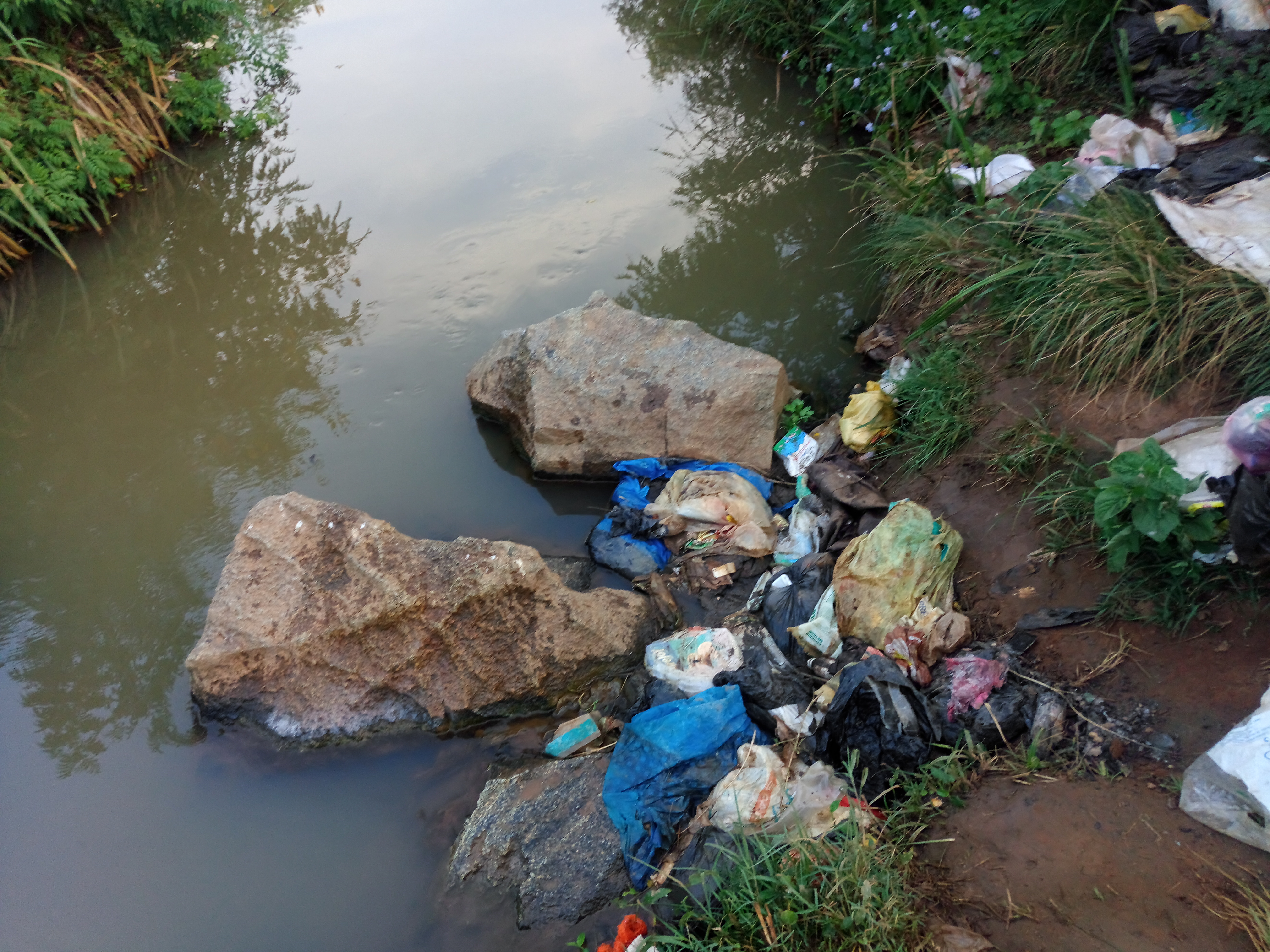Used disposable diapers are dumped in water sources and can cause public health problems.
By Nontobeko Mlangeni
The Phatsa Sakho Nawe (bring your own bag) experiment undertaken by the UNDP Eswatini Acc. Lab last year changed the way single-use plastic bags are distributed by retailers across the country. This resulted in major reductions in the amount of plastic bags distributed because they are now issued on only two days per week. Along with this experiment came a lot of public debate around issues of waste management.
While several waste streams are a challenge in the country, sanitary waste stood out, in particular, used disposable diapers. The perception survey which was undertaken as part of the Phatsa Sakho Nawe campaign also highlighted the need to find solutions to this challenge. This, along with the results of other past UNDP and Eswatini Environmental Authority (EEA) initiatives such as the 2016 Waste Indaba, justified the need to pursue this as one of the Lab’s frontier challenges for 2021.
The AccLab is building on some work that some organisations and communities have done on this issue. These organisations include Enactus – a tertiary student organisation focused on innovation, which worked with a small community in Kwaluseni to find solutions to manage the disposal of single-use diapers. The Royal Science and Technology Park has also done some work to map solutions to this challenge.
Towards a Circular Economy
With the country now moving towards a circular economy that promotes sustainable solutions for dealing with waste, the Lab was challenged to explore solutions higher up in the waste hierarchy when it came to disposable diapers. The hierarchy draws on the precautionary principle; in that reducing waste is likely to cause far less harm to people and the environment than putting it into landfill will. It prioritises the reduction of waste, then its reuse, recycling, recovery, and lastly, the optimisation of its final disposal.
The Sustainable Inclusive Economic Growth Portfolio in the Country Programme Document (CPD 2021-2025) for the Kingdom of Eswatini recognizes the need to promote a circular economy, which has the dual potential of creating new jobs and livelihoods while improving waste management.
UNDP aims to adopt a holistic approach whereby every type of waste is part of a closed-loop process chain, thus creating a sustainable value chain for the waste management economy. Building on the work initiated through the Phatsa Sakho Nawe Campaign, the Lab’s focus will be to support the promotion of a circular economy through the mapping and testing of solutions that are higher up in this hierarchy. Such solutions are not only beneficial to the environment but also have financial gains for users. For instance, reusable nappies, which may be considered one of the sustainable solutions to single-use diapers, tend to be cheaper in the long run. According to the South African Cloth Nappy Users Association for example, on average, one child will use disposable nappies to the total cost of over E15,000.00 ($1100) by the time they are potty trained, compared to an average cost of E3 500.00 ($250) for cloth nappies.
The Challenge in Eswatini
Initial indications to understanding this challenge pointed to several issues:
1. Rural and peri-urban areas lack adequate waste collection systems. Diapers are currently disposed of indiscriminately in environmentally sensitive sites such as waterways, rangelands, etc.
2. Lack of adequate solutions or technologies for appropriately disposing of single-use diapers.
3. Lack of sustainable options or solutions that fall higher up in the waste hierarchy.
4. An adequate solution should consider women because childcare and taking care of household duties is largely their responsibility.
5. Diapers have a low propensity for recycling and degradation – according to the World Wildlife Fund. They take over 500 years to decompose.
6. Lack of awareness on the impacts and possible solutions to this challenge
The Case for Sustainable Alternatives
Additionally, the high volumes of single-use diapers that are imported and their increasing affordability make them an attractive option even for low-income earners. According to Eswatini Revenue Authority (2021), over 70 tonnes of single-use diapers were imported in the last three years. Moreover, the 2017 National Census reveals that the country has 130 208 infants which could be within the diaper-wearing bracket (Central Statistical Office). With the cost of a single-use diaper going for as little as E2.00 ( $0.14) each, an increasing number of mothers/caregivers are using them. Observations from informal peri-urban households show the high use of disposable diapers even for low-income earners who earn an average salary of E15 00.00 (~US$ 100) per month.
According to the South African Cloth Nappy Users Association, a child will use 4 140 disposable nappies and generate almost a ton of waste (952kg) by the time they are potty trained. With the number of children of diaper-wearing age in the country, the call for more sustainable options is very urgent.
Moreover, used disposable diapers may contain viruses and microbes which can cause public health problems if they are leached out from illegal dumpsites into the soil and water. According to the World Health Organization, used diapers should first be rinsed before being discarded to ensure that raw human waste does not get disposed of in landfills and other disposal sites. It is doubtful if any consumers follow these guidelines.
Solutions Mapping and Experimentation
The AccLab plans to use an ‘innovation challenge call’ to map solutions to address the waste from used disposable nappies. The aim is to unearth solutions that provide alternative, affordable and sustainable options as demonstrated in the Phatsa Sakho Nawe Campaign. The idea is to set up an experiment with two groups of mothers/caregivers - one will be the control group which will continue to use disposable nappies and the other an experiment group that will use re-usable nappies. The aim is to learn and identify the levers of change that would drive the adoption of more sustainable options to the single-use diaper.

 Locations
Locations



